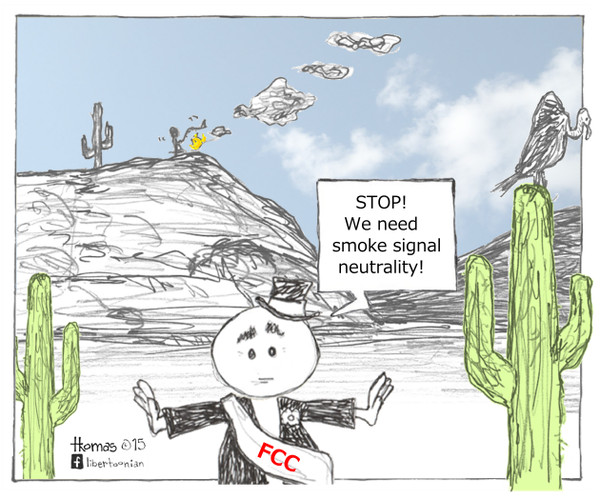Net neutrality has been an insanely hot topic recently. I've always been proud of the overlap between the Bitcoin and liberty-loving communities, but the net neutrality debate has been an important reminder that varying opinions exist within both groups. Quite honestly, I was surprised that some of my favorite Bitcoiners would advocate this kind of government regulation.
#NetNeutrality victory! Grumpy Cat flies over @Comcast HQ to say Don't Mess with the Internet! http://t.co/wxSnXkUI5X pic.twitter.com/Br4LgcSRBt
— Bitcoins and Gravy (@BTCandG) February 27, 2015
Live from the Internet Archive! Yes! Net neutrality. That is what we need! https://t.co/RSOSIKf5xh
— Mad Bitcoins (@MadBitcoins) February 27, 2015
Net Neutrality Causes Problems
It would be very easy for me to say that all government regulation is backed by violence and force, so net neutrality must be wrong, but I'll try to do better than that. Jeffrey Tucker posted an extremely well-received article that reflects many of my thoughts. I think his shipping analogy sums things up nicely.
By analogy, let's imagine that a retailer furniture company were in a position to offload all their shipping costs to the trucking industry. By government decree, the truckers were not permitted to charge any more or less whether they were shipping one chair or a whole houseful of furniture. Would the furniture sellers favor such a deal? Absolutely. They could call this "furniture neutrality" and fob it off on the public as preventing control of furniture by the shipping industry.
Few of us are in the furniture business, however, so I think a slightly modified analogy hits even closer to home. Imagine if overnight shipping was required by law to cost the same as First Class shipping. That's clearly absurd. The flat shipping price might start low, but then everyone would choose overnight shipping for every single package. Who wouldn't ship overnight if it was the same price as slower shipping?
Eventually, carriers would start losing a boatload of money. They would be forced to either nix overnight shipping entirely or push the flat rate through the roof. Then I would have to pay a fortune to ship anything - even if I was in no rush.
Amazon's Physical and Digital Shipping
As a huge provider of digital content, Amazon has often been mentioned in net neutrality discussions. The common belief is that neither Amazon nor it's customers should have to be charged more for high-bandwidth content. My first question would be simple: Why? High-bandwidth content is obviously more demanding for ISPs to provide and fast access is certainly more valuable to consumers, so why on earth should it cost the same?
Our physical shipping analogy actually applies almost perfectly to Amazon. Imagine that the company could provide it's popular two-day shipping for the same cost as slower shipping options. At first, Amazon might love the idea if carriers reduced two-day shipping prices to match other prices, but as I explained above, they would eventually be forced to raise all shipping prices. The head honchos at Amazon can surely see how this works, so why would they ever support shipping neutrality?
What's more, many ISPs (like AT&T and Verizon) have generally come to support net neutrality, even though they are the internet's shipping carriers who will either have to suffer the costs of quick delivery or raise prices. According Mr. Tucker, that support exists because our ISPs are gigantic companies with the ability to absorb those extra costs - costs that a brand new, start-up ISP would never be able to afford. Likewise, Amazon might even be willing to pay more for two-day shipping because a start-up internet retailer would never be able to do the same, and competition would be limited.
Internet Monopolies
At this point, I've spent several paragraphs comparing ISPs to shipping carriers and I can see many net neutrality advocates shouting at their computer screens, "Those two industries are nothing alike!" The most popular argument I've read is that ISPs are in a somewhat monopolistic situation, so they need to be regulated more closely. I disagree.
The ACLU claims that "Most Americans don't have more than a handful of legitimate high-speed broadband options at home (the vast majority have three or fewer)." First of all - three?! Sure, it's always better to have more options, but there is still PLENTY of room for competition among three companies. The only number that really matters is how many people only have one choice.
Second, why did they only look at "high-speed broadband options"? High speeds are certainly nice to have, but there are plenty of other viable options out there. Is it unfair that a Lamborghini costs more than a Honda Civic? I know from experience that even satellite internet can serve videos at acceptable speeds and that's available virtually anywhere - from multiple providers, no less! Wireless solutions like satellite and cellular networks are improving daily.
Bitcoin Can Improve the Internet
This brings me to the idea that originally got me thinking about net neutrality today. Over at WIRED, Peter Van Valkenburgh proposed a Bitcoin-related plan for improving internet access and gaining a more legitimate net neutrality.
The general idea is that a mesh network could be created using the Wi-Fi access points that already exist all over the place. Bitcoin could be used as a micropayment platform for people to buy unused bandwidth from nearby nodes. Buyers could then either use that bandwidth themselves or sell it down the line to another node in need. Our computers would automatically search for the quickest and cheapest path to the desired server. The Bitcoin network might need to be optimized before it's fully prepared for micropayments, but that's being worked on.
If this idea was eventually put in place, it would allow for better internet access with less need for hardwired solutions like fiber. Granted, the Wi-Fi access itself would have to originate from somewhere, but it could be shared and extended much more efficiently. It would be like internet for the internet.
I encourage you to explore that proposal for yourself, as it explains the concept much more eloquently than I can. To me, that solution still requires a significant level of development, since routers are not at all prepared to safely share internet access or handle Bitcoin payments, but I love the idea in general.
Forget Net Neutrality and Innovate
All of this is made possible because Bitcoin payments are extremely easy and cheap. Anytime a product (in this case, internet access) can be distributed more easily, a freer market is bound to follow. If we really want to improve internet access, let's not focus on making rules and restricting possibilities. Rather, let's innovate and discover the best ways to connect people as cheaply and as quickly as possible.
Before I finish, I should make it clear that I'm no expert on the legal details of net neutrality (and technically, no one really is, since the regulations haven't even been made public yet). The above thoughts were some generalized opinions about the idea of regulating the internet. If you're looking for a perspective from someone who understands much more than I do, this guy knows what he's talking about.
Please leave a comment and share what you think about net neutrality!
And to wrap up, a sweet cartoon from Libertoonian (used with permission):

 You, Me, and BTC Your Liberty & Bitcoin Podcast
You, Me, and BTC Your Liberty & Bitcoin Podcast





